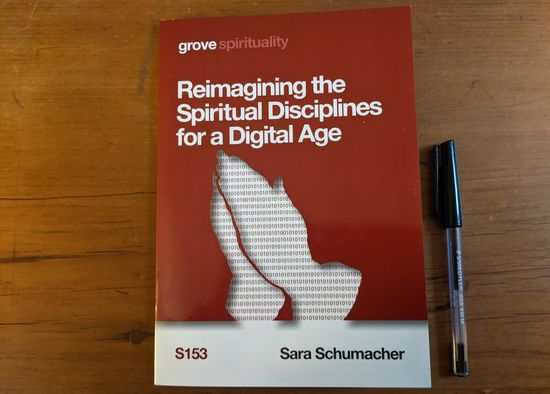
In just under 25 pages, Sara Schumacher, Director of Education at St. Mellitus College, packs in more clarity, focus, and personal encouragement than books 10 times the length on the subject of spiritual disciplines.[1] This might be a bold claim, but let me talk you through why I think this book(let) is really important, especially as we learn to adapt to so much of our life happening online.
Reimagining the Spiritual Disciples for a Digital Age starts with the observation that a lot of conversations have been happening across sociology, psychology, even in technology, on the impact of technology is having on humanity. Within these conversations, phrases like ‘digital minimalism’ get thrown around, and practices like a ‘30-day digital declutter’ are suggested. When you stand back a bit it becomes apparent that a lot of these concepts map to what Christians have called spiritual disciplines or habits of grace. Schumacher takes authors such as Cal Newport (Digital Minimalism) and Sherry Turkle (Alone Together, Reclaiming the Conversation), and uses their writing as “conversation partners” as “a different lens through which to recover and reimagine our own spiritual practice in a digital age.” But, Sara notes, their writing can never fully explain why humans respond so well to these practices because:
“…Christian theology offers something back to these writers, specifically an explanation for why these disciplines lead to human flourishing. They are not simple giving or evolutionary; instead, they evidence a God-given order in creation.” [2]
Now, whenever I hear about spiritual disciplines my mind is taken straight into an expectation of a guilt trip, where I leave the book, talk, or seminar with the stress of not having read my Bible enough that week, or prayed enough as a result of some distraction or other. This book isn’t a guilt trip. Sara isn’t going to berate you. Instead, this book help you put in place scaffolding, scaffolding not just to help you want to practice these disciplines, but so that you can flourish them, and also in many other areas too.
The three foundations that Reimagining the Spiritual Disciplines for a Digital Age focuses on are that of Solitude, Simplicity, and Sabbath. Each section has three parts, first, conversations drawn from the writing of authors such as Newport and Turkle, secondly moving into a Biblical anchoring for each habit/discipline showing how it is played out in God’s word, and finally Sara’s own reflections on how this habit has challenged and changed her. It is these personal reflections which take each section from what I have previously seen as ‘good ideas that I might get around to at some point’, to being relatable and desirable. They have pushed me to think and explore how I need to rewire my daily patterns in a time where I just crave distraction.
For example in the chapter focusing on solitude, referencing Turkle, Sara writes “without a secure sense of self that is generated by being alone ‘we turn to other people to support our sense of self’” - we attempt to counter our loneliness by seeking external validation - and as a result lose any chance of individual identity. Then turning to the gospels we’re shown how Jesus points not just to saying it’s a good thing, but actively modelling it:
“Jesus sought time alone with the Father, often in the midst of busyness, and we are invited to do the same… As we are alone with God, solitude helps us to cultivate an inward attentiveness to the activity of God… Solitude puts us in a place to be transformed by the Spirit into our true identity as a child of God.” [3]
Finally on reflecting on deciding to choose solitude in her commute rather than the distraction of a podcast, Sara talks honestly and openly about this practice taking her through boredom, into churning thoughts, which in turn “drove me to prayer”.
This book is worth reading, not just because it is short (and that is it’s favour), but because I think we all know that distraction isn’t the answer. Change isn’t something that happens overnight, habits and disciplines take time and work to form. Reading this booked help me (re)discover that perhaps I have been trying to start mine from a place of distraction rather than a place of quiet and calm.
This booklet is short and easy to approach, but is packed with things to make you think long after the hour-or-so it will take you to read. Priced at £3.95 you should buy a copy.
Reimagining the Spiritual Disciplines for a Digital Age is published by Grove Books. You can purchase a copy from their website, alongside a number of other booklets exploring different intersections of Christianity and technology.
Footnotes
There are also books that are 10 times the length that do this well too, and are very much worth reading, such as Habits of Grace by David Mathis, or 12 Ways Your Phone is Changing You by Tony Reinke. In fact, after reading this book, and want to read more add them to your reading list would be no bad thing. ↩︎
Reimagining the Spiritual Disciplines for a Digital Age, Sara Schumacher, Chapter 2 (Pg 7) ↩︎
Reimagining the Spiritual Disciplines for a Digital Age, Sara Schumacher, Chapter 4 (Pg 11) ↩︎
Post changelog
- 2022-01-19 – Poke some more tags
- 2022-01-13 – Tidy up a number of blog posts for tags
- 2021-02-01 – typo fixes
- 2021-01-31 – Book Review: Reimagining the Spiritual Disciplines for a Digital Age
